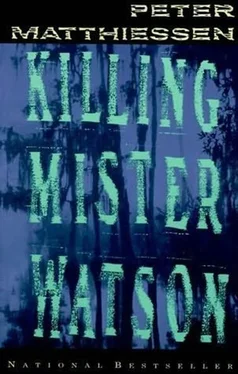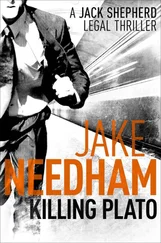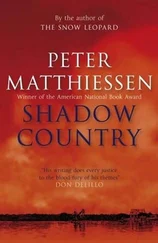Peter Matthiessen - Killing Mister Watson
Здесь есть возможность читать онлайн «Peter Matthiessen - Killing Mister Watson» весь текст электронной книги совершенно бесплатно (целиком полную версию без сокращений). В некоторых случаях можно слушать аудио, скачать через торрент в формате fb2 и присутствует краткое содержание. Жанр: Современная проза, на английском языке. Описание произведения, (предисловие) а так же отзывы посетителей доступны на портале библиотеки ЛибКат.
- Название:Killing Mister Watson
- Автор:
- Жанр:
- Год:неизвестен
- ISBN:нет данных
- Рейтинг книги:4 / 5. Голосов: 1
-
Избранное:Добавить в избранное
- Отзывы:
-
Ваша оценка:
- 80
- 1
- 2
- 3
- 4
- 5
Killing Mister Watson: краткое содержание, описание и аннотация
Предлагаем к чтению аннотацию, описание, краткое содержание или предисловие (зависит от того, что написал сам автор книги «Killing Mister Watson»). Если вы не нашли необходимую информацию о книге — напишите в комментариях, мы постараемся отыскать её.
Killing Mister Watson — читать онлайн бесплатно полную книгу (весь текст) целиком
Ниже представлен текст книги, разбитый по страницам. Система сохранения места последней прочитанной страницы, позволяет с удобством читать онлайн бесплатно книгу «Killing Mister Watson», без необходимости каждый раз заново искать на чём Вы остановились. Поставьте закладку, и сможете в любой момент перейти на страницу, на которой закончили чтение.
Интервал:
Закладка:
In 1887, a west coast railroad terminus was finally established, not at Fort Myers but at Punta Gorda, thirty miles off to the north. As cattleman-trader Francis Hendry would observe, "America is moving, and Fort Myers has been left behind." With no bridge across the Calusa Hatchee and no roads, the town on the broad tranquil river remained cut off from the rest of the country except by sea, and commerce was limited to nonperishable export products-otter and raccoon pelts, deer and alligator hides, bird plumes, taxidermy specimens, sugar and molasses, and beef cattle. The cattle trade to Cuba was worth far more than all the other businesses combined.
In the year of the financial panic, 1893 (when E.J. Watson arrived in the region), the cattle industry on which the town depended suffered badly, and so did the growing trade in wild animal parts. But the following year, big freezes farther north in Florida drove many citrus growers south to the Calusa River. A rise in land values, a first rush of investment, was consolidated a few years later by new cattle profits from the Spanish-American War.
Without a railroad or a road bridge to link it to the outside world, Fort Myers remained a muddy cow town, or a dusty one, depending on the season. The cattle docks at Punta Rassa that T.E. "Doc" Langford and James Hendry had bought in the eighties from Jake Summerlin were still the foundation of the Fort Myers economy, as the cattlemen-traders extended their concerns to land development, rail commerce, and banking.
Under the circumstances, you will understand how significant it was that within five years of his arrival in the region, Mr. Watson's daughter Carrie married T.E. Langford's son.
Meanwhile, Mr. Watson's bouts of violent carousing were restricted to the seaports of Key West and Tampa. There is no report of intemperate behavior in Everglade or Chokoloskee, where his friends and neighbors had most chance to observe him, nor in Fort Myers, where his genteel family came to live. His son-in-law, Walter G. Langford, was a friend of Sheriff Frank B. Tippins from their cowboy days, which doubtless encouraged a certain lenience towards Langford's father-in-law. In addition, Mr. Watson was protected by Langford's powerful friends, including the aforementioned Jim Cole.
CARRIE WATSON
MARCH 3, 1898. What a momentous year, and scarcely started!
On January 1st, electric light came on for the first time at the new Fort Myers Hotel, and also in several business establishments, Langford & Hendry, for one. (Of course, our "fair city" has had electric light since 1887, when Mr. Edison lit up his Seminole Lodge. That glorious blaze was the first electric lighting in the land, claims Captain Cole, but he warns us not to pester Mr. Edison on that point. He's scared we might find out it isn't so!)
On February 16, our international telegraph station at Punta Rassa got the very first word in all America about the explosion of the great battleship Maine while lying peacefully at anchor in Havana Harbor! 260 young Americans, killed in their sleep! The "dastardly Spaniards," as our paper calls them, claim it was the ship's own magazines, but no one who wants the Spanish "off our doorstep" is going to believe that for a minute.
And here is the third historic piece of news! On 8 July, Miss Carrie Watson will marry Mr. Walter G. Langford of this city!
In the evening Walter walks me down to the new hotel to see the new electric lights and the beautiful royal palms, and attend the weekly concerts of the Fort Myers Brass Band at the new bandstand. The whole town turns out to hear patriotic airs in honor of "our brave boys" in Cuba, who have brought so much prosperity to our town. Afterwards, if there is room, he "courts" me-whatever can that mean?-on the old wood bench beneath the banyan tree just opposite the Baptist church, from where our good shepherd, Mr. Whidden, can spy on us young "lovers" through his narrow windows.
Who would have thought "the Union banner" would ever be cheered here in Fort Myers? Well, Stars and Stripes are everywhere! What must it be like at Key West Harbor! And now we're after the "d____________________ Spaniards" in the Philippines!
Remember the Maine! our cowboys yell, galloping through the streets, raising such dust! We're shipping our cattle to Cuba again, not for those cruel Spaniards this time but for Teddy Roosevelt's Rough Riders. The Hendrys and Summerlins, Captain Jim Cole and the Langfords are feeling very patriotic these days. Captain Cole says it right out, "War is the best damned business that there is!" (To which Papa retorts, "These civic leaders use up too much air!")
Mama deplores the cattlemen's tin patriotism, all this misty-eyed flag-waving and fine speechifying. Our brave young men, who have no say about it, are sent off to be killed so that thick-bodied old businessmen can wave the flag and prosper off our "splendid little war," as some politician dared call it. (How "splendid" is it for those scared homesick boys who do the dying? Mama asks.)
Papa, too, is fiercely patriotic (although the words "brave Yankee boys" still set his teeth on edge), but seeing the Langfords and Mr. Cole make so much money off this "Yankee War" has made him cynical. The Watsons were planters in South Carolina when these people were still "ridge-runners," as he calls them, and he'll be d--d, says he, if he'll let himself be patronized by this "redneck gentry."
Walter calls Jim Cole a "man's man," while admitting he is a "rough diamond." I can't find any diamond in the man, a hard dull glint is all I see. Dear Walter has his weaknesses, like whiskey, but he is kind, that's why folks like him. Captain Cole has no give to him, Mama observes, and knowing this, he takes Walter along to "grease" his business dealings-this is Papa talking.
Walter would like to "go bag him a Spaniard," but he cannot abandon his mother when his father is so ill, so he'll stay home and learn his father's business. Dr. Langford is an excellent doctor, he takes good care of Mama, but in recent years-Papa again-his keen interest in finance makes him pay more mind to cattle than to people. "Doc" Langford and Mr. Cole are grazing stock at Raulerson Prairie at Cape Sable, but Papa says the horseflies and mosquitoes will show them what damn fools they are if the poor coast grass doesn't starve their cattle first. If Papa didn't rest his cows in a screened shed between sunset and sunup, they would run out of blood, he says, let alone milk.
Papa met José Martí in Key West, and admired his Cuban Revolutionary Party, but he says we should not fool ourselves about our interests. He hates the Spaniards as sincerely as the next man, but says the U.S. picked this fight in Cuba, Maine or no Maine, it's just an excuse to clean Spain out of our hemisphere once and for all, and grab the Philippines and Puerto Rico while we're at it. The War with Spain isn't one bit different than what he still calls "the War of Yankee Aggression": the Old South, says he, was the first conquest of the Yankee Empire.
Dear Papa will not salute the Stars and Stripes. "An Edgefield man would die first," Papa says. Yet he doesn't like it when Mama quotes Mark Twain, who has recently written that Old Glory should be changed to a pirate flag, with black stripes and each star a skull and crossbones. As long as this great land of ours is fighting, the men aren't fussy about who they fight-this is Mama talking with her small bent smile. Papa smiles, too, but he is wary. Mama's needles fly as she quotes from an editorial read at the library, "'The taste of Empire is in the mouth of the people, even as the taste of blood-'"
"Kindly let me read my own paper in peace!" Papa snaps his paper.
"'This is God Almighty's war, we are only His agents'-do you believe that, dear?"
Читать дальшеИнтервал:
Закладка:
Похожие книги на «Killing Mister Watson»
Представляем Вашему вниманию похожие книги на «Killing Mister Watson» списком для выбора. Мы отобрали схожую по названию и смыслу литературу в надежде предоставить читателям больше вариантов отыскать новые, интересные, ещё непрочитанные произведения.
Обсуждение, отзывы о книге «Killing Mister Watson» и просто собственные мнения читателей. Оставьте ваши комментарии, напишите, что Вы думаете о произведении, его смысле или главных героях. Укажите что конкретно понравилось, а что нет, и почему Вы так считаете.












